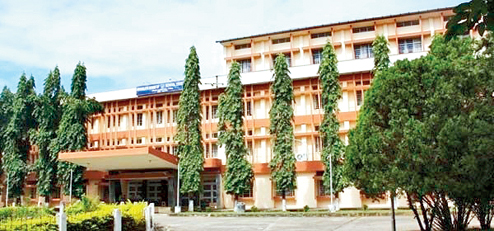 |
| Meghalaya Board of School Education |
Shillong, Nov. 3: A language which was once listed in Unesco’s Atlas of the World’s Languages in Danger has now become a mere optional subject for higher secondary school students in Meghalaya.
The decision taken by the Meghalaya Board of School Education to remove Khasi as a compulsory subject at the higher secondary school level has outraged several civil society groups, who met officials of the Board here today to urge them to revoke the decision.
The groups include the Meghalaya People’s Human Rights Council (MPHRC), the Khasi Authors’ Society, the Khasi Publishers Allied Society, the Joint Action Committee of All Teachers Associations of Meghalaya, the Khasi Jaiñtia Welfare Association and the Hynñiewtrep Youths’ Council, among others.
Under the Board, Khasi has all along been one of the compulsory modern Indian languages, the others being Garo, Assamese, Bengali, Hindi, Nepali, and Mizo.
However, a notification issued by the board on September 5, 2013, transformed Khasi from a “compulsory” to an “elective” subject.
It is an irony that while Khasi is a “compulsory” subject for the Class X board examination under the Council for the Indian School Certificate Examinations, the Meghalaya Board’s notification has unburdened higher secondary school students from “compulsorily” writing their mother tongue during examinations.
Another irony is that while Khasi and Garo languages were recognised and notified as Associate Official Languages of the state after the Meghalaya State Language Act, 2005 received the assent of the governor on May 1, 2005, the Meghalaya Board opted to make Khasi an “elective” subject.
While scholars from the state continue to insist inclusion of the Khasi language in the Eighth Schedule, the Board’s notification would certainly weaken the materialisation of this pending demand.
The reasons for making Khasi an “elective” subject are unknown.
The Board’s executive chairman, E.P. Kharbhih, was unavailable for comment despite repeated attempts.
MPHRC chairman Dino D.G. Dympep said during their meeting with Kharbhih they stressed on the importance of keeping Khasi as a compulsory subject till the higher secondary school level.
“Since Khasi is crucial for the identity of our indigenous people, it should be enriched and expanded. The language is also one of the associate official languages of the state and it is important that it be made compulsory for all the streams at the higher secondary level,” Dympep said.
While Khasi is also a subject at the degree level, Dympep said it would cause immense harm if it is no longer a compulsory subject at the higher secondary level. “In the light of the above, we have demanded from the Board officials to ensure that the Khasi language remains a compulsory subject.”
Besides, several students have completed their master’s and doctoral degrees in Khasi from the North Eastern Hill University (Nehu).
According to the Directorate of School Education and Literacy, there are 112 higher secondary schools in the state and these come under the government, deficit, ad hoc, unaided or private, and unaided or purely private categories.
The Board’s officials are understood to have told the groups that they will take up the matter before the academic committee for discussion.
Khasi, as a language, was recognised by Calcutta University up to the entrance examination standard in 1900 and up to the degree level in 1919, the same year the Assamese language was recognised by the same university. It was recognised by Gauhati University in 1948. Dibrugarh University, the Council for the Indian Certificate of Secondary Education, New Delhi and North Eastern Hill University have also accorded recognition to it.
In 2012, Unesco removed Khasi from the Atlas of the World’s Languages in Danger after the status of the language was reassessed by the editorial board of the atlas, which concluded that Khasi might be classified as “safe” on Unesco’s scale of language vitality.
Rev. Thomas Jones, who is referred to as the father of the Khasi alphabet, is said to have laid the foundation for Khasi literature. The Khasi language was developed and expanded based on the Sohra dialect, commonly known as Ka Ktien Sohra. Rev. Jones had arrived at Sohra on June 22, 1841. He was the first missionary to have been sent to the Khasi hills by the Welsh Calvinistic Methodist Foreign Missionary Society.
The language is spoken by more than 10 lakh people in the state. It is also spoken in Assam’s Barak Valley and parts of Bangladesh. Besides, various other dialects are spoken in different parts of the Khasi hills.










